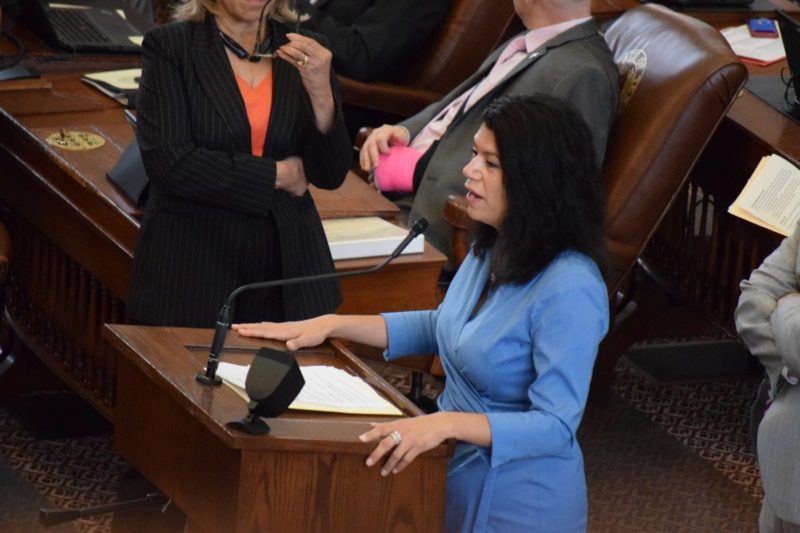Texas Republicans Find Another Way to Make Abortion Care Inaccessible
“Unfortunately, some politicians remain single-mindedly fixated on pushing abortion out of reach in our state."

Texas lawmakers in the state house on Tuesday approved a bill that would require people to purchase a separate health insurance plan to cover abortion care. In an emotional debate on the house floor, Democrats spoke against the proposal, claiming the legislation’s lack of exceptions would require women to purchase “rape insurance.”
Reproductive rights activists filled several sections of the house gallery, and broke out into light applause and audible jeers during tense moments in the floor debate.
Activists and Democratic lawmakers wore white roses in memory of Rosie Jimenez, a Texas woman who died in 1977 in what advocates view as a consequence of the ban on federal funding of abortion care.
Heather Busby, executive director of NARAL Pro-Choice Texas, said in a statement that Texas lawmakers continue to interfere with the reproductive health care decisions of women and families, despite vocal opposition.
“Unfortunately, some politicians remain single-mindedly fixated on pushing abortion out of reach in our state,” Busby said. “If last year’s Supreme Court ruling won’t slow them down—Texans will have to do it ourselves. We will continue making our voices heard and growing our numbers until we can defeat these politically-motivated attacks on abortion coverage.”
HB 214, sponsored by Rep. John Smithee (R-Amarillo), would prohibit insurance coverage of “elective” abortion care by qualified health plans offered through the Affordable Care Act (ACA) exchange. The bill would require that insurance coverage of abortion be purchased as “optional or supplemental coverage.”
Smithee introduced a similar bill during the regular legislative session.
The bill includes an exception for a “medical emergency,” allowing coverage of abortion care if a pregnant person is facing a “life-threatening physical condition” that a physician determines places the patient in “danger of death or a serious risk of substantial impairment of a major bodily function.”
There is no exception for cases of rape, incest, or severe fetal anomaly.
The GOP-held house voted down seven amendments offered by Democrats, including an amendment proposed by Rep. Chris Turner (D-Grand Prairie) that would provide exceptions for cases of rape or incest.
Turner said that without the exception, lawmakers would be forcing women to purchase “rape insurance,” reported the Texas Tribune.
“Women don’t plan to be raped. Parents don’t plan for their children to be victims of incest,” Turner said. “Asking a woman or a parent to foresee something like that and buy supplemental insurance to cover that horrific possibility is not only ridiculous, it is cruel.”
Bills to prohibit health insurance coverage of abortion care have been regularly introduced in GOP-dominated state legislatures.
Twenty-five states restrict coverage of abortion care in insurance plans offered through the ACA exchanges, and 21 states prohibit coverage of abortion care in plans offered to state employees, according to the Guttmacher Institute.
Ten states prohibit abortion coverage in all private health insurance plans.
Rep. Donna Howard (D-Austin) criticized the legislation as “another notch in the belt” for anti-choice Republican lawmakers, reported the Austin American-Statesman.
“This does appear to be strictly a political bill that has no real impact except perhaps to harass people again,” Howard said.
After more than three hours of debate, the house gave initial approval of the bill with a 95-51 vote.
An identical bill was passed on July 26 by the state senate in a 20-10 vote. As in the house, the senate rejected all amendments offered by Democrats. If either bill is passed by both chambers, it would go on to the governor.
Legislation to ban insurance coverage of abortion care was one of 20 items Gov. Greg Abbott (R) included on his agenda when he called a special session of the Texas legislature, which convened on July 18.
